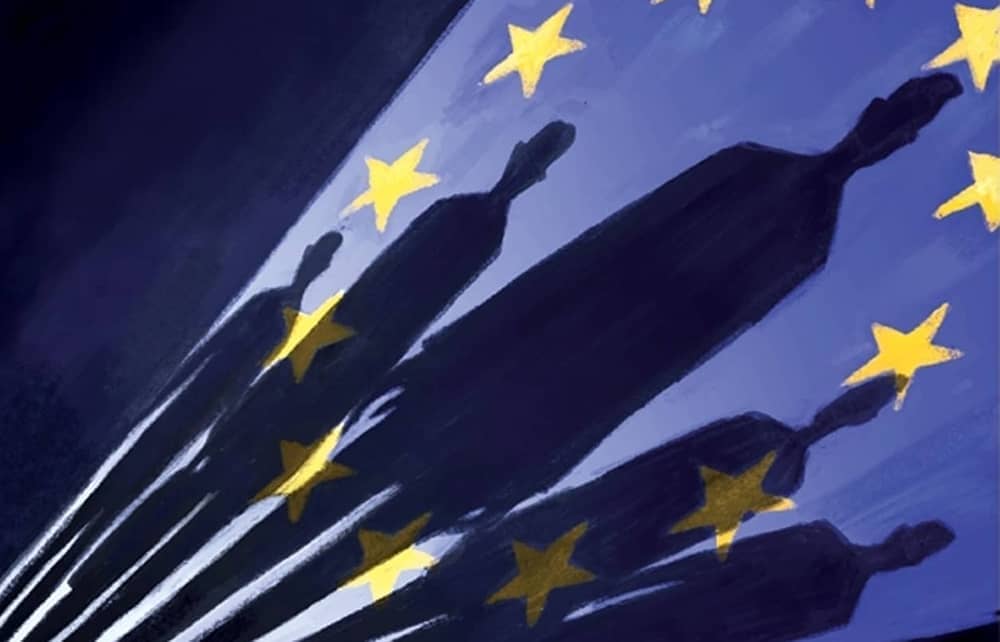Simon Kuper’s Chums: How a Tiny Caste of Oxford Tories Took Over the UK is a wonderful compendium of anecdotes about Oxford in the 1980s, one of the best of which concerns a lecture he attended by the Marxist theorist Terry Eagleton just after the fall of the Berlin Wall. Eagleton dismisses the collapse of the communist regimes across Eastern Europe as a minor source of annoyance that has no bearing on the validity of his beliefs. A student on Kuper’s right takes notes throughout and at the conclusion of the lecture reads his summary: ‘Presumably ironic.’
Eagleton wasn’t being ironic, and neither is Kuper in this blistering attack on Boris Johnson, Michael Gove, Daniel Hannan, Jacob Rees-Mogg and Dominic Cummings, among others, for masterminding our exit from the EU. Indeed, Kuper’s theory about what motivated these scoundrels is straight out of a Marxist textbook: it was a cynical attempt by Britain’s desiccated ruling class to repatriate power to Westminster so they could assume their rightful place as masters of the political universe.
‘Brexit was above all their generational grand project designed to protect the powers of their personal fiefdom of Westminster,’ he writes. ‘The rest was just detail – boring issues of governance best left to swotty civil servants.’ But just as Eagleton’s Marxism survives a brutal reality bath, so too does Kuper’s. According to his dialectical materialism, the ‘Tory toffs’ who campaigned for Brexit were intoxicated by a nostalgic idea of Britain’s past – a heady cocktail of Evelyn Waugh, P.G. Wodehouse and the Beano – which they were determined to restore in all its glory. So what if Brexit would have dire economic consequences? They didn’t care because they were protected by the high–paying jobs they’d walked into, thanks to some string-pulling from their parents. ‘If you make £200,000 a year, the threat of recession is just an irritation,’ he writes. ‘But if you make £20,000 it’s a personal crisis, and if you are making £15,000 then you will worry about still being able to feed your children.’
There’s nothing wrong with Kuper’s Marxist analysis, but he’s misunderstood who the real bourgeoisie are
Layered on top of these incitements to class war is a bit of wokery pokery, linking the Euroscepticism of these arrogant public schoolboys to their white privilege: ‘As straight white men, they were (in the unmatched phrase of the writer John Scalzi) playing the game called The Real World with the difficulty setting on “Easy”.’ He notes how disgraceful their attitude to women is, catching a glimpse of it as an undergraduate in the late 1980s. ‘At meetings of my college’s junior common room, if a woman tried to speak, it was customary for men to chant: “Get your tits out for the lads!”’ he writes.
The Berlin Wall moment for Kuper – when his Marxist assumptions ran aground on the shores of reality – is the Leave victory in the EU referendum. After all, if Brexit is a political project devised by a clique of privately educated Oxford graduates to advance their own class interests at the expense of everyone else, why on earth did 17.4 million people vote for it? Were they all duped by these foppish chancers who’d honed their debating skills in the Oxford Union? Boris may be a silver-tongued public speaker, but he’s not that good.
The fundamental flaw in Kuper’s marvellously chippy book is his failure to recognise that it was Britain’s continuing membership of the EU, not Brexit, that served the interest of our ruling class. I don’t just mean the farm subsidies for the landed gentry, the chance for businessmen to bid for European contracts, the cheap imported labour or the peerless boondoggle of being an MEP. It was also the opportunities it provided for the metropolitan elite to look down their noses at the ‘little Englanders’ in the shires, with their weird attachment to this ‘cake-filled misery-laden grey old island’ (Emma Thompson).
There’s nothing wrong with Kuper’s Marxist analysis of Brexit, but he’s misunderstood who the real bourgeoisie are. You’d think the fact that an even more privileged group from this Oxford generation campaigned for Remain would tip him off – David Cameron, George Osborne, Jeremy Hunt, Rory Stewart, Nick Boles and Hugo Dixon, among others.
One anecdote that doesn’t appear in this book is that a mock EU referendum was held among the boys at Eton in 2016 which Remain won by a landslide. But the school’s domestic staff – the cleaners, cooks and gardeners – held their own ballot and an equally large majority voted for Leave. That pattern more or less repeated itself across the country on 23 June.
Watch Toby Young and Simon Kuper debate the ‘chumocracy’ on SpectatorTV







Comments